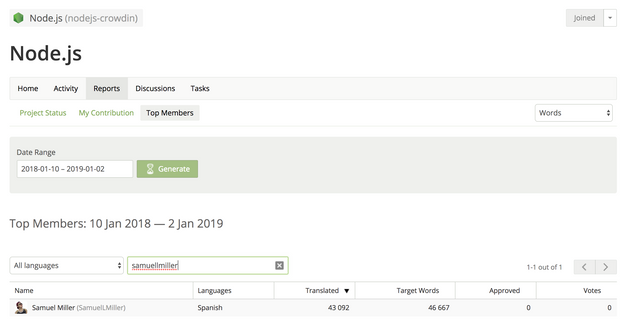[Translation][Spanish] Node.js (1103 words) (Part 40)
Repository
https://github.com/nodejs/i18n
Project Details
Node.js, by definition, is an open-source, cross-platform JavaScript run-time environment that executes JavaScript code outside the browser. This means that now it is possible to execute a program written in JS outside a web browser such as Google Chrome, Safari, etc. This creates an extension to what the language can do, besides just creating interactive websites. With the help of the V8 JavaScript runtime engine, it can now take the code and convert it into a faster machine code, e. g., Node.js eliminates the waiting and continues to take care of the next task.
From my personal perspective, Node.js represents an advantage for the coders to write code, since it still has all the capabilities and functionalities JavaScript offers, but now in a more extended way. Also, thanks to all the time I have been contributing with this project, I have realized the huge amount of time and effort that the Node.js team has taken in order to make it as good as it is and also to improve it with every single upgrade.
You can take a look at their Crowdin project here.
Contribution Specifications
- Translation Overview
This is the 40th translation I made for the Node.js project, and on this contribution I kept working on the Changelog_IOJS.md folder, which I define as follows:
-- CHANGELOG_IOJS.md: this folder is meant to keep a record of notes related to the Node.js project, such as notable changes, known issues and commits, made throughout every upgrade of the project. The format of the strings on this folder is organized by paragraphs -which every single one defines a unique change made within a function or a file- that starts with the code number of the change, followed by the change, and ending with the name of the author between parenthesis.
On this contribution I found a very interesting term and learned a lot abut its importance and functionality: ARMv6. First, let's define what an ARM actually is. The ARM Architecture forms part of a family of reduced instruction set computing (RISC) architectures for computer processors, which is configured for different environments. The Arm Holdings company is the one that develops this architecture and licenses it to other companies, who decide the design of their own products that implement one of those architectures. It also designs cores, which are reusable units of logic, cells, or integrated circuits.
So far this definition sounds very complex, so here's a picture that may clarify what this all means.
This is a picture of a core that is utilized in plenty different products, such as smartphones, iPods, game consoles and navigations systems. There are many different cores that have been made since their first creation around the 1980s. However, the most popular ones to use currently are the ARMv6 and the ARMv7. Actually, their differences relies only in their components, but besides that, they are both very similar. You can find a list that defines their differences with more detail here
Now, to make it sound even more clear, an ARMv6 is an ARM architecture core that is used to incorporate memory, interfaces, radios, etc., into an specific product.
References:
-- Wikipedia. ARM Architectures (https://en.wikipedia.org/wiki/ARM_architecture#Cores)
-- Single-Boards. ARMv6 vs ARMv7 (http://single-boards.com/armv6-vs-armv7/)
- Languages
I translated from English to Spanish.
I have translated over 100,000 words utilizing the Crowdin platform and this has given me experience to always grant great quality translations.
- Word Count
I have translated 1,103 words. This contribution has been made between the dates Jan/01/2019, when I realized the translation, and Jan/02/2019, when I realized the corrections.
Previous translations on this project:
- Part 1
- Part 2
- Part 3
- Part 4
- Part 5
- Part 6
- Part 7
- Part 8
- Part 9
- Part 10
- Part 11
- Part 12
- Part 13
- Part 14
- Part 15
- Part 16
- Part 17
- Part 18
- Part 19
- Part 20
- Part 21
- Part 22
- Part 23
- Part 24
- Part 25
- Part 26
- Part 27
- Part 28
- Part 29
- Part 30
- Part 31
- Part 32
- Part 33
- Part 34
- Part 35
- Part 36
- Part 37
- Part 38
- Part 39



Greetings, @samuellmiller. Thanks for submitting your contribution!
Congratulations on this contribution!
Your contribution has been evaluated according to Utopian policies and guidelines, as well as a predefined set of questions pertaining to the category.
To view those questions and the relevant answers related to your post, click here.
Chat with us on Discord
Thank you for your review, @alejohannes! Keep up the good work!
Hi @samuellmiller!
Your post was upvoted by @steem-ua, new Steem dApp, using UserAuthority for algorithmic post curation!
Your post is eligible for our upvote, thanks to our collaboration with @utopian-io!
Feel free to join our @steem-ua Discord server
Hey, @samuellmiller!
Thanks for contributing on Utopian.
We’re already looking forward to your next contribution!
Get higher incentives and support Utopian.io!
Simply set @utopian.pay as a 5% (or higher) payout beneficiary on your contribution post (via SteemPlus or Steeditor).
Want to chat? Join us on Discord https://discord.gg/h52nFrV.
Vote for Utopian Witness!